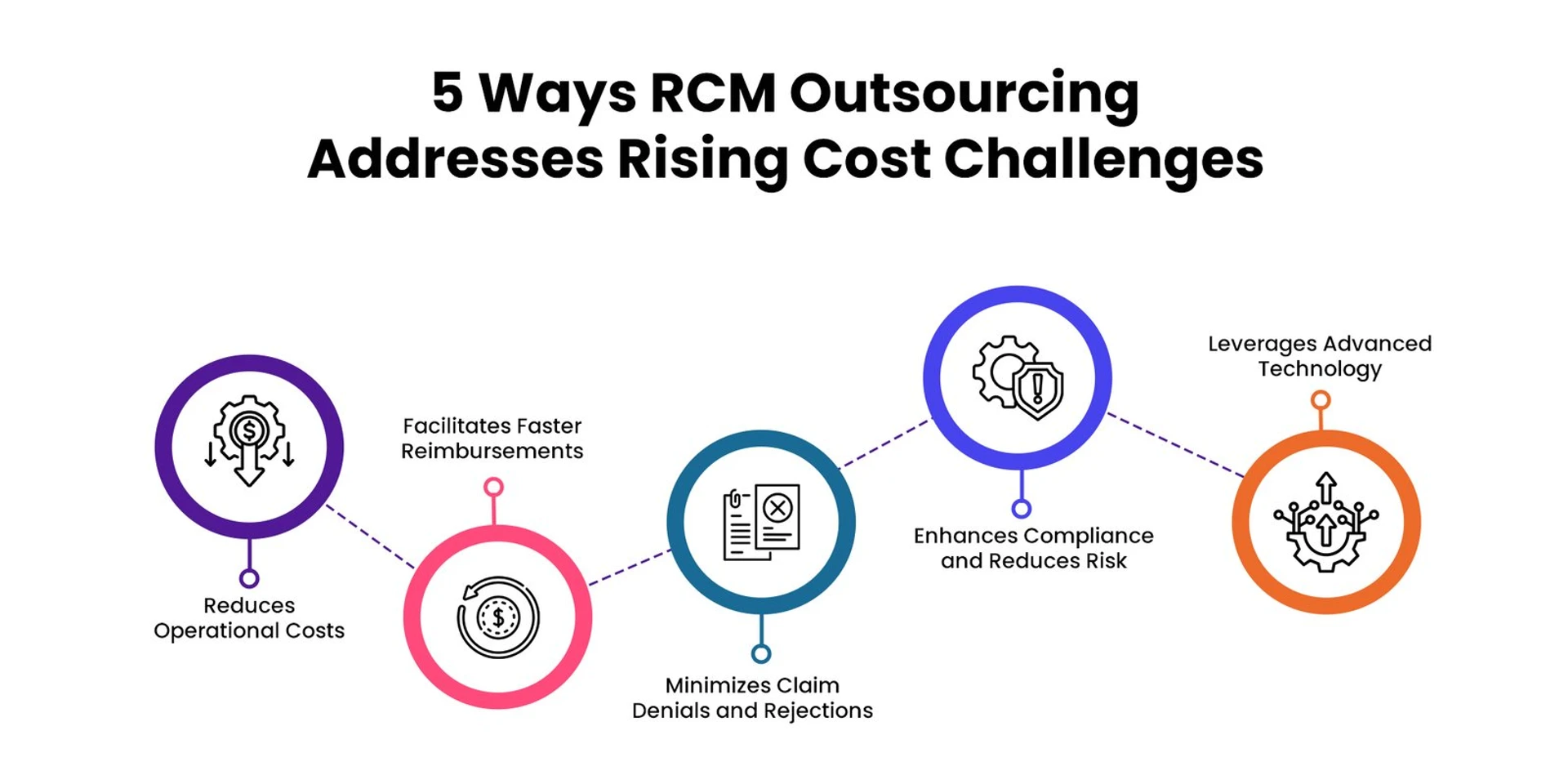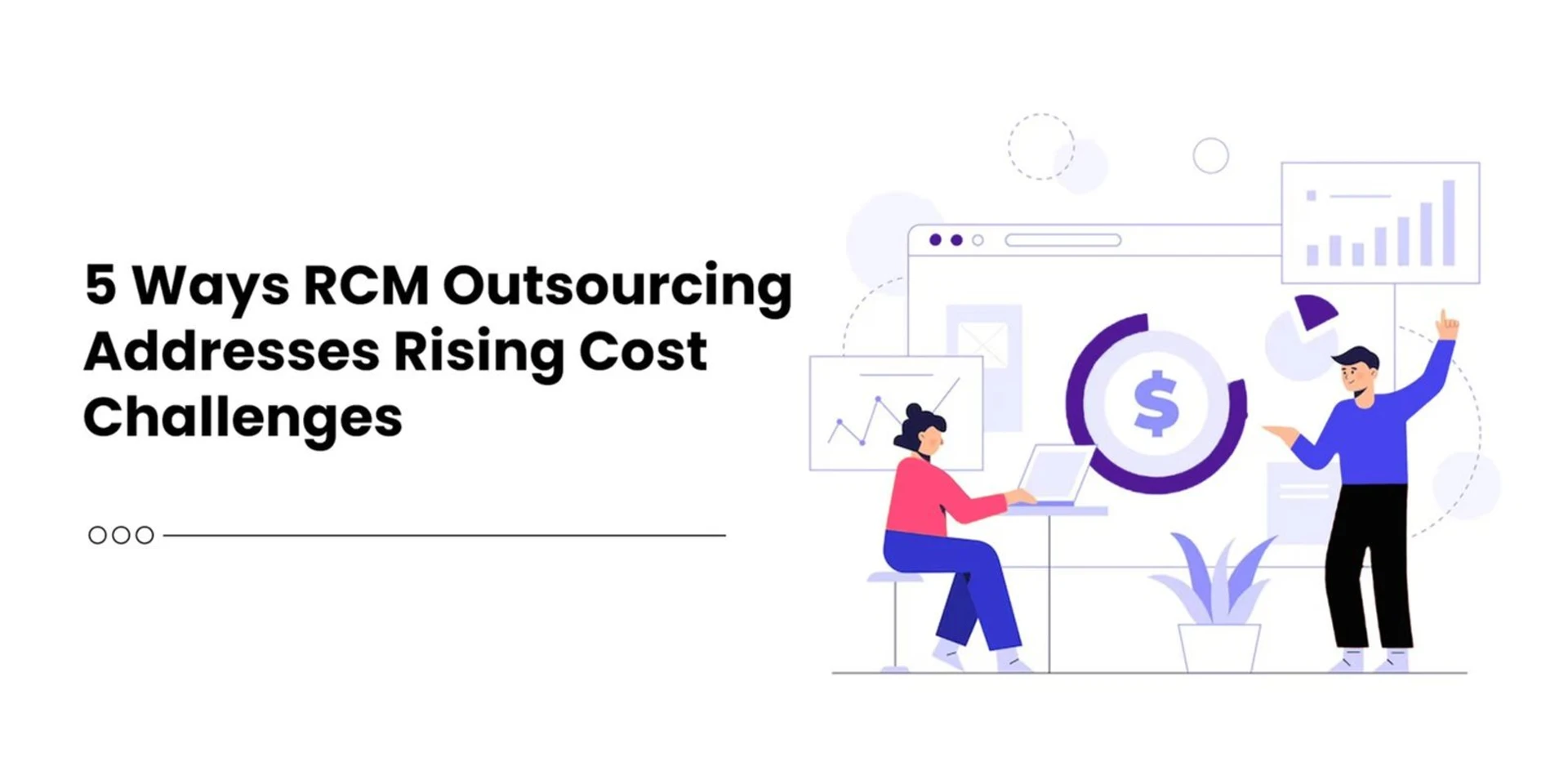It is no news that the cost of healthcare is rising, while the number of healthcare staff is falling. In such a scenario, healthcare organizations are struggling to make every dollar, every staff count.
According to a recent industry report, 90% of healthcare CFOs are currently experiencing a labor shortage in their revenue cycle management (RCM) departments.
Given the continued economic pressures and workforce challenges, healthcare providers are starting to rethink revenue cycle management—an area that, in many organizations, is still completely manual and in which new hires are hard to find.
Outsourcing is a smart step in curtailing the surging healthcare costs as well as reducing labor shortage. It is an effective way to access expensive and advanced RCM technologies which most healthcare providers cannot afford to implement.
In this blog, we understand the importance of RCM outsourcing and the top five ways it addresses rising cost challenges for healthcare providers.
Why Is RCM Outsourcing Important for Healthcare Providers?
RCM outsourcing has become an essential strategic move for healthcare providers looking to maximize their financial performance in today’s fast-changing healthcare environment.
RCM solutions providers come with industry knowledge, advanced technology, and economies of scale that in-house RCM operations often lack due to limited resource and skill magnitudes.
Their expertise empowers healthcare organizations to effortlessly navigate through insurance claims, coding rules, and patient billing. In addition to this, RCM outsourcing vendors operate solely on revenue cycle management. This makes it easier for them to keep up-to-date with industry trends and best practices much more easily than in-house teams.
With these external resources, healthcare providers can be freed up to concentrate on their core competency, i.e., delivering patient care as efficiently as possible while also managing financial operations seamlessly.
5 Ways RCM Outsourcing Addresses Rising Cost Challenges

Here are the top five ways RCM outsourcing can address a healthcare organization’s rising cost challenges:
Cuts Down Operational Costs
Partnering with a specialized RCM solution provider can significantly lower the overhead costs for maintaining an in-house billing department. This means, healthcare organizations can save a large chunk of money on staff salaries, benefits, training, and the overall costs of updating and maintaining billing software.
Outsourcing partners typically operate on a more cost-effective scale because the expenses can be spread out over multiple clients. It is this economy of scale that allows them to deliver their services at just a fraction of the cost of running an equivalent in-house operation.
Additionally, the transition from fixed costs to variable costs enables healthcare providers to be more flexible financially, thereby enabling them to scale their revenue cycle management resources depending on current needs and budgetary restrictions.
Enhances Cash Flow Through Faster Reimbursements
Specialized RCM firms hire trained billers and coders who understand the nuances of medical billing and coding regulations.
Advanced technology, combined with streamlined workflows, produces faster and more accurate claim submissions. This, in turn, allows claims to be processed much faster, thus reducing the lag time between service and payment.
This enhanced cash flow not just helps healthcare providers meet current obligations but also provides them with the capital to make strategic investments in patient care.
Reduces Claim Rejections and Denials
One of the major causes of revenue leakage for most providers is claim denials and rejections. Fortunately, RCM outsourcing helps with this challenge by utilizing expert skills and technology, thereby cutting down mistakes while optimizing the claim management.
Outsourcing partners use high-level software that flags potential claims-denial issues before the submission of a claim, thereby decreasing any possible denial of the claims.
In case of denial, these specialized firms also have teams that come up with explanation so that required corrections are made, and the claim is resubmitted within the shortest time possible. This also cuts down a lot of the administrative burden for healthcare organizations.
By reducing denials and rejections, RCM outsourcing helps healthcare providers save a larger portion of their earned revenues. This, of course, directly impacts on their bottom lines and financial stability.
Improves Compliance and Reduces Risks
Maintaining regulation and increasing requirements within the complex and ever-changing healthcare regulatory landscape is both challenging and vital.
However, RCM outsourcing simplifies this challenge as well. These partners typically invest in staying abreast with changing regulatory requirements, coding updates, and payer needs.
From the process of registration of a patient to the point of collection of final payment, revenue cycle expertise runs through the entire process. This also brings savings to healthcare providers from a number of potential compliance violations which again may expose them to huge fines as well as damage to reputation.
Many of the RCM outsourcing partners continue to provide regular audits and reports, enabling healthcare organizations to have much more visibility into compliance status as well as what areas require improvement. This, in turn, not just mitigates risks but also instils confidence in both patients and payers.
Leverages Advanced Technology Without High Upfront Costs
Keeping pace with technological advancements in healthcare revenue management can be expensive and tedious for individual providers.
RCM outsourcing offers a solution by providing access to advanced technology without the need for significant upfront investments.
Outsourcing partners typically utilize advanced analytics, artificial intelligence, and machine learning tools to optimize the revenue cycle. These technologies can predict claim outcomes, identify potential underpayments, and automate many aspects of the billing process.
By leveraging these advanced tools through an outsourcing partner, healthcare providers can benefit from improved accuracy, efficiency, and insights without bearing the full cost of purchasing, implementing, and maintaining these systems themselves. This not only reduces technology-related expenses but also ensures that the organization always has access to the latest and most effective RCM tools and technologies.
Wrapping Up
As we have discussed in this blog, outsourcing RCM offers multiple ways to address the rising cost concerns in the healthcare industry today. It reduces the cost of operations and improves cash flow, while cutting down the rate of claim denials, improving compliance, and utilizing advanced technology.
But remember that a decision to outsource RCM does not come easy. Specific needs of your organization must be considered before taking a step ahead.
If you are thinking about outsourcing a part or all of your RCM processes, look for a reliable RCM partner, one that understands your processes and serves all your unique needs. With the right RCM solution provider, you can pave to reduced costs and improved margins, while always staying ahead in competition.






